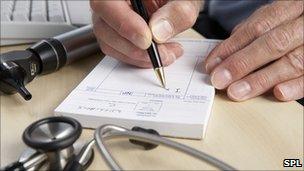BMA: NHS changes 'mean doctors prefer Wales to England'
- Published

BMA Cymru says many doctors disagree with the UK government's prescription for the NHS
NHS changes mean a strong majority of doctors prefer working in Wales to England, the British Medical Association (BMA) Cymru claims.
Of over 5,000 doctors surveyed in Wales, 86% were glad to be in Wales.
However, Wrexham GP Dr Peter Saul said it was "only because things are so bad in England".
The UK BMA is meeting in Cardiff this week, and will debate changes which would see GPs in England taking charge of budgets in practice-led consortia.
Under the initial plans, hundreds of consortia will be set up across England to take charge of commissioning services for their patients, and will be handed up to 80% of the NHS budget.
The NHS shake-up was put on hold earlier this year while the UK government carried out a listening exercise.
Health is a devolved issue in Wales and the proposed changes will apply only in England.
The BMA in England said it did not have figures to compare to the survey done in Wales.
It said amendments had been made to the health bill, but there was "more work to be done".
The BMA Wales said the results of its survey "speak loud and clear".
Dr Andrew Dearden, chairman of the BMA in Wales, said: "Doctors in Wales remain loyal to the principles set out for the NHS by Aneurin Bevan.
"Consecutive Welsh Governments have diminished the role of the private sector from the NHS, and the purchaser/provider split no longer operates.
'Quality lifestyle'
"This was the right decision for doctors, and the right decision for patients - meeting the needs of everyone and free at the point of delivery.
"We really believe that Wales has it all - doctors can work in attractive surroundings offering excellent facilities and professional support, with the added benefits of a quality lifestyle - reasonably priced housing, good schools and access to beautiful countryside.
"Wales is a clear winner when it comes to aligning career development with work-life balance."
However, Dr Peter Saul, a GP in Rhos, Wrexham, said it was "only because things are so bad in England".
Dr Saul, chair of the North Wales Faculty of the Royal College of GPs, added: "There are lots of serious concerns about the health service in Wales, particularly about the funding issues, that we seem to be getting bigger cuts than in England.
"We're seeing waiting times and waiting lists going up in Wales and for GPs and doctors on the front line, it's difficult to see how you can get listened to in the health structures in Wales."
He said the policy in Wales had been towards a more centrally-run system, and the aim was to see Welsh patients being treated by Welsh providers.
But he warned: "We don't want to turn provision of health care in north Wales into a ghetto where we can't access the best possible services for our patients."
Responding to the survey, Welsh health minister Lesley Griffiths said: "Our vision for the NHS in Wales is very different to that being pursued by the government in England.
"Indeed, our approach is true to the principles of Aneurin Bevan - a health service that is free at the point of need."
She said Wales favoured a system which focused on cooperation "to drive up standards, rather than a marketplace driven by competition".
BMA chairman Dr Hamish Meldrum said he was concerned about the impact across the whole UK from "slash and burn" cuts to NHS services in a drive to save money.
But the Department of Health said: "We have been very clear that NHS organisations should not interpret efficiency savings as budget and service cuts.
"We have also said that every penny saved through efficiency savings will be reinvested back into front line services."
- Published27 June 2011
- Published8 June 2011
- Published26 May 2011
- Published19 October 2010